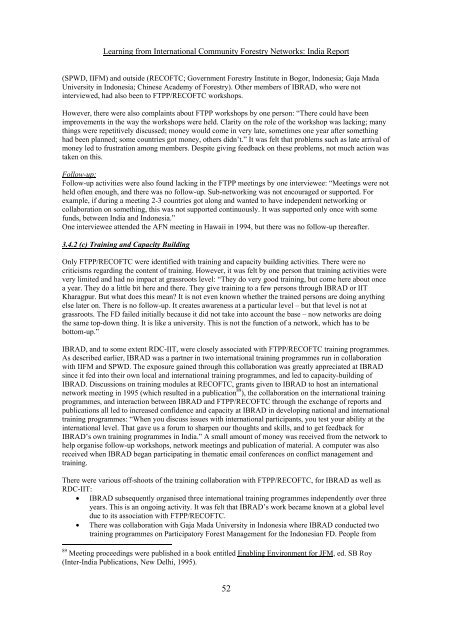Snapshots of International Community Forestry Networks: Country ...
Snapshots of International Community Forestry Networks: Country ...
Snapshots of International Community Forestry Networks: Country ...
Create successful ePaper yourself
Turn your PDF publications into a flip-book with our unique Google optimized e-Paper software.
Learning from <strong>International</strong> <strong>Community</strong> <strong>Forestry</strong> <strong>Networks</strong>: India Report<br />
(SPWD, IIFM) and outside (RECOFTC; Government <strong>Forestry</strong> Institute in Bogor, Indonesia; Gaja Mada<br />
University in Indonesia; Chinese Academy <strong>of</strong> <strong>Forestry</strong>). Other members <strong>of</strong> IBRAD, who were not<br />
interviewed, had also been to FTPP/RECOFTC workshops.<br />
However, there were also complaints about FTPP workshops by one person: “There could have been<br />
improvements in the way the workshops were held. Clarity on the role <strong>of</strong> the workshop was lacking; many<br />
things were repetitively discussed; money would come in very late, sometimes one year after something<br />
had been planned; some countries got money, others didn’t.” It was felt that problems such as late arrival <strong>of</strong><br />
money led to frustration among members. Despite giving feedback on these problems, not much action was<br />
taken on this.<br />
Follow-up:<br />
Follow-up activities were also found lacking in the FTPP meetings by one interviewee: “Meetings were not<br />
held <strong>of</strong>ten enough, and there was no follow-up. Sub-networking was not encouraged or supported. For<br />
example, if during a meeting 2-3 countries got along and wanted to have independent networking or<br />
collaboration on something, this was not supported continuously. It was supported only once with some<br />
funds, between India and Indonesia.”<br />
One interviewee attended the AFN meeting in Hawaii in 1994, but there was no follow-up thereafter.<br />
3.4.2 (c) Training and Capacity Building<br />
Only FTPP/RECOFTC were identified with training and capacity building activities. There were no<br />
criticisms regarding the content <strong>of</strong> training. However, it was felt by one person that training activities were<br />
very limited and had no impact at grassroots level: “They do very good training, but come here about once<br />
a year. They do a little bit here and there. They give training to a few persons through IBRAD or IIT<br />
Kharagpur. But what does this mean? It is not even known whether the trained persons are doing anything<br />
else later on. There is no follow-up. It creates awareness at a particular level – but that level is not at<br />
grassroots. The FD failed initially because it did not take into account the base – now networks are doing<br />
the same top-down thing. It is like a university. This is not the function <strong>of</strong> a network, which has to be<br />
bottom-up.”<br />
IBRAD, and to some extent RDC-IIT, were closely associated with FTPP/RECOFTC training programmes.<br />
As described earlier, IBRAD was a partner in two international training programmes run in collaboration<br />
with IIFM and SPWD. The exposure gained through this collaboration was greatly appreciated at IBRAD<br />
since it fed into their own local and international training programmes, and led to capacity-building <strong>of</strong><br />
IBRAD. Discussions on training modules at RECOFTC, grants given to IBRAD to host an international<br />
network meeting in 1995 (which resulted in a publication 89 ), the collaboration on the international training<br />
programmes, and interaction between IBRAD and FTPP/RECOFTC through the exchange <strong>of</strong> reports and<br />
publications all led to increased confidence and capacity at IBRAD in developing national and international<br />
training programmes: “When you discuss issues with international participants, you test your ability at the<br />
international level. That gave us a forum to sharpen our thoughts and skills, and to get feedback for<br />
IBRAD’s own training programmes in India.” A small amount <strong>of</strong> money was received from the network to<br />
help organise follow-up workshops, network meetings and publication <strong>of</strong> material. A computer was also<br />
received when IBRAD began participating in thematic email conferences on conflict management and<br />
training.<br />
There were various <strong>of</strong>f-shoots <strong>of</strong> the training collaboration with FTPP/RECOFTC, for IBRAD as well as<br />
RDC-IIT:<br />
• IBRAD subsequently organised three international training programmes independently over three<br />
years. This is an ongoing activity. It was felt that IBRAD’s work became known at a global level<br />
due to its association with FTPP/RECOFTC.<br />
• There was collaboration with Gaja Mada University in Indonesia where IBRAD conducted two<br />
training programmes on Participatory Forest Management for the Indonesian FD. People from<br />
89<br />
Meeting proceedings were published in a book entitled Enabling Environment for JFM, ed. SB Roy<br />
(Inter-India Publications, New Delhi, 1995).<br />
52

















![CynefinFramework final [Read-Only]](https://img.yumpu.com/19017304/1/190x135/cynefinframework-final-read-only.jpg?quality=85)